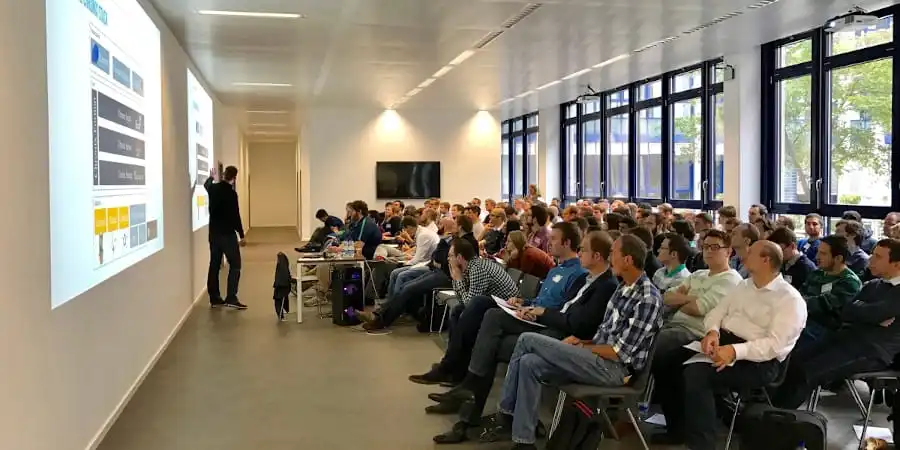
DaDaDa 2016 - Intro to Datageeks Data Day
We started with the concept of a full-day meetup in 2016. Our aim was to provide the entire community with the opportunity to participate at a sort of data science conference at the expense of a ticket to the movies.
Transcript Summary
History and Foundation of Munich Data Geeks
The Munich Data Geeks meetup series was founded in May 2013 by Florian Hartl and Miguel Cabrera. The meetups continued until 2014 when both founders relocated - one to work for Yelp and another moved to the US. In spring 2014, the current organizers took over, and in 2015 when they moved to Berlin, they decided to establish a formal public club (Verein) to continue organizing the events. By the time of this event, the organization had successfully hosted 25 meetups.
Organizational Structure
The organization is run by a board of five members who can be found at the venue. Additionally, there are approximately 20 volunteers who help organize and support the events. These volunteers are available throughout the event to assist attendees with any questions or needs.
Mission and Purpose
Munich Data Geeks was founded based on the recognition that Munich needed an independent organization to connect different stakeholders in the data science community. The organization serves as a bridge between the community itself, research institutions, industry companies, and government entities. As a nonprofit club, the organization focuses on connecting people through meetups without any commercial interests.
Meetup Format and Content
The meetups focus exclusively on topics related to artificial intelligence, machine learning, and data-related subjects. Initially, the organization attempted to hold meetups every two months, though this wasn't always achievable. At the time of this event, they had transitioned to monthly meetups.
The organization strives to maintain a balanced program between industry and research perspectives, featuring talks from both sectors. The events combine presentations with extensive networking opportunities, and this particular event included a party with refreshments. The venue also features a Sonos music system where attendees can add songs to a playlist and vote on them.
Community-Driven Approach
As a nonprofit organization without commercial backing, most talks are contributed by community members themselves - attendees from previous meetups who have topics they want to share. This community-driven approach reflects the organization's commitment to being a platform for the members rather than a corporate entity.
New Job Portal Feature
The organization recently launched a job portal on their website specifically focused on data science positions in Munich and the surrounding area. This portal is highly specialized, featuring only data science roles - no development positions or other job types. The platform is free for everyone to use, whether they are companies looking for data scientists or individuals seeking opportunities.
Companies and research institutions can post job openings, while candidates can create profiles with details about their projects, skills, and work preferences. The portal allows users to either save their profiles as drafts or publish them publicly. Once published, candidate profiles become visible to companies searching for talent. The speaker demonstrated the portal during the presentation, showing how it functions as a connecting point between employers and job seekers in the Munich data science community.
Event Sponsors and Setup
The event was made possible through sponsors, with attendee tickets of 15 euros covering only a small portion of costs. The main sponsor, QAWARE, provided the venue and facilities. Additional sponsors included other companies whose booths were set up at the venue, offering goodies and information about their services. Attendees were encouraged to visit these sponsor areas during breaks.
Event Schedule
The day's program included multiple talks separated by a 15-minute break, followed by lunch. The schedule continued with three more talks, then a live coding session where technical skills would be demonstrated. Dinner would follow, and the day would conclude with a networking party. Before each talk, sponsors were given five minutes to introduce themselves to the attendees. The speaker specifically mentioned that one of the presenters, Karim, had previously given well-received talks at Munich Data Geeks events, including an entertaining presentation about using data mining to find apartments.
